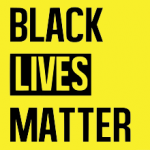By Danny Chisholm

My daughter and I were out last Saturday getting some back to school items as she prepares for her sophomore year of college. As I drove, she checked her Twitter feed and suddenly broke out into laughter. We had been talking about Charlottesville and all that was taking place there, so I was a little confused.
We looked at a photo of all those white men standing around that church house Friday night as they held up torches to light up the night sky. They were shouting in unison in an effort to intimidate the people gathered inside for a prayer service. What was funny to us was the meme that was born out of this revealing photo: “when you have to use a Polynesian cultural product (tiki torches) to defend and assert white supremacy.”
On Sunday, I addressed the developments over the weekend and wondered aloud what some of the participants in that photo might be doing now. I would imagine that a good many of them would be in church, and when asked what they did over the weekend, they could say, “I went to Charlottesville for an Alt-Right rally to assert my white privilege. I insulted black people, paraded the streets with the Confederate and Nazi flags, chanted Nazi slogans and had my picture taken in a Klan like moment around a church house.” Then they would pick up their hymnals or view projection screens and sing about the love of God.
Like many of you, I’ve gone through a gambit of emotions as I’ve tried to unpack the significance of the events of last weekend. I’m saddened by the loss of life and disgusted at the vitriol and boldness of the white supremacists. Then I come back to that photo and meme going viral on Twitter, with them standing there with their tiki torches. It’s an image worthy of being mocked and minimized.
Luke 8:26-39 offers a record of Jesus’ encounter with a demon-possessed man. The man had not worn clothes or lived in a house for a long time. He didn’t live among the people at all, but was at the mercy of this unclean spirit who would drive him out into solitary places. Here is the passage:
“What do you want with me, Jesus, Son of the Most High God? I beg you, don’t torture me!” For Jesus had commanded the impure spirit to come out of the man. Many times it had seized him, and though he was chained hand and foot and kept under guard, he had broken his chains and had been driven by the demon into solitary places. Jesus asked him, “What is your name?” “Legion,” he replied, because many demons had entered into him.
It’s important that we call out white supremacy for what it is: a demonic presence in our nation. We can’t deal with this problem when we aren’t willing to use its name.
Sometimes pastors are cautioned about bringing politics into the pulpit. We must remember that the gospel is necessarily political as it impacts our world, but it doesn’t have to be partisan. This is not a ‘right or left’ issue but rather a ‘right and wrong’ issue. There are times for the church to speak up as to let our nation know we aren’t asleep at the wheel and that we see what’s going on. Not talking about something doesn’t make it go away or mean it isn’t there. Silence from the church can imply complicity and sympathy. We must not allow that.
There is a lot of evil in our world; some of those demonic forces were on display in Charlottesville last weekend. It can seem that these forces of hate are becoming stronger and bolder. At the same time, however, these moments are opportunities for the church to name and call out white supremacy. We don’t have to agree on theological nuance. We do need to agree and show solidarity on this issue. Hate must not find a home in our churches.
In a similar vein, it’s absolutely critical for our elected leaders to also name and call out white supremacy and violence without equivocation. The church needs to impress the importance of this on them. Charlottesville isn’t the first or last time we’ll need to stand together as the people of God. We will need to persevere.
There are certain moments when it’s important to speak up. The church has an opportunity to name and call out one of the demons that has been tormenting us for a long time. Let’s begin by looking at the man or woman in the mirror and ask the Lord to “cast out” any attitudes or behaviors that don’t belong in us.
And, let’s work toward being a community of faith reflected in Galatians 3.28: “There is neither Jew nor Gentile, neither slave nor free, nor is there male and female, for you are all one in Christ Jesus. When we do this, our whiteness or any other skin color will pale in comparison to how we show Christ to our world.
Jesus asked for the name of the demon. To get the name of the demon was to get control over it. Jesus named the demon, called it out, and cast it out.
That’s what has to be done today. And it will be tomorrow as well.
Danny Chisholm serves as senior pastor of University Heights Baptist Church in Springfield, Mo. Read his blog online at https:/dannychisholm.wordpress.com and connect on Twitter at @ChisholmDanny
Note: The views expressed here in columns and commentaries are solely those of the authors.
Interested in writing for CBF at Patheos? Submit your column idea to CBF Communications Director Aaron Weaver at aweaver@cbf.net.














